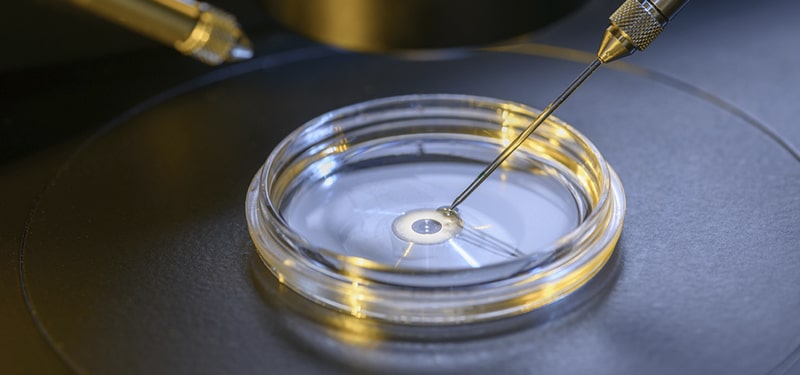According to Dr. Richa for ICSI in Lucknow, the critical difference between IVF and ICSI is how the sperm fertilizes the egg. In IVF, eggs, and sperm (many) are left to fertilize themselves in the laboratory. In ICSI, the selected sperm is injected directly into the egg.
ICSI Center in Lucknow

Intracytoplasmic Sperm Injection (ICSI)
Intracytoplasmic Sperm Injection (ICSI) refers to the special form of In Vitro Fertilisation which is primarily done in severe cases of male infertility. For the process of ICSI, at first, the eggs are harvested and denuded after 2-3 hours and then transferred to a lab dish. Within a few hours, a single sperm is injected through a fine needle to the centre of an egg cell with the help of an ICSI machine. This is done to aid the process of fertilization. If the process is successful, the cell will divide and start to form an embryo.
Usually, several egg cells are harvested and fertilized at the same time and once embryos are made they are transferred as per their quality and grading.
Why is ICSI done?
Circumstances, where ICSI is recommended, include:
- - Low sperm count
- - Poor sperm motility
- - Poor sperm morphology or Abnormal shape of sperm
- - In cases of azoospermia or no sperm in the semen level.
- - When the sperms are retrieved through testicular biopsy by TESA/Micro-TESE
- - When previous IVF procedure is failed
- - When there is a high level of antibodies in semen
- - When handling infectious cases of HIV, HBS, HCV
How is ICSI done?
ICSI is a part of IVF and is done in the same way. For the process of ICSI, you will be given fertility medications to stimulate your ovaries to develop several mature fertilizing eggs. Once the eggs are ready, they are retrieved by aspiration under anaesthesia. Meantime, the sperm is also collected from the male partner and is washed carefully. The best sperm is chosen for the process.
With the help of a very fine needle, the chosen sperm is injected in the cytoplasm of the egg. The egg is then placed into the incubator. Within 24 hours, the egg begins displaying the signs of fertilization and continues to form an embryo which is transferred later in the womb of the lady.
What are the risks associated with ICSI?
ICSI is a safe procedure for creating embryos and helps in increasing the chances of success in IVF especially in cases of male factor infertility.
What is the success rate of ICSI?
The success rate for ICSI depends on factors like the quality of egg and sperm because if the quality is better, good grade embryos would be generated and would increase the chances of success of conception and if the quality is not good then vice-versa.
Can ICSI affect a child’s development?
If a woman gets pregnant naturally, the chances of the baby having a major birth defect are 1.5 percent to 3 percent. The chance of ICSI-related birth defects is similar to IVF but somewhat higher than that of natural conception.
FAQs
New Scientist reports that a recent study showed that ICSI has a pregnancy success rate of 24%. While IVF without ICSI still has a slightly higher pregnancy success rate at 27%, they are not bad for anyone who has already tried other methods of assisted reproductive technology. You can visit Dr. Richa clinic for the best treatment and the best ICSI cost in Lucknow.
ICSI can help men with low quality or quantity of sperms by injecting it directly into the oocyte overcoming the factor of motility and quantity. According to Dr. Richa at the ICSI center in Lucknow, the rate of fertilization with ICSI is generally around 90%, so many clinics use ICSI to guarantee fertilization.









